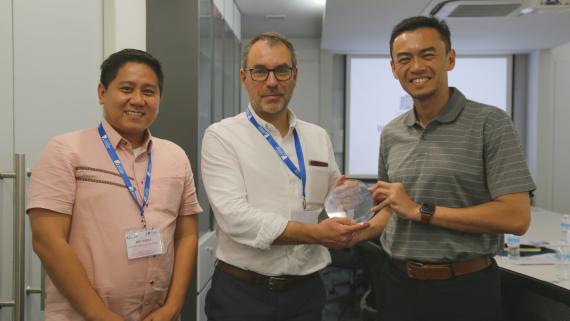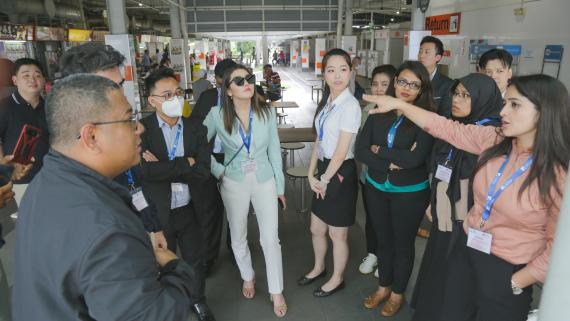The program design of KASYP 13.2 applies the best practices and lessons learnt from earlier reiterations of KASYP workshops, and adult learning principles that was introduced to KASYP in 2020. KASYP 13.2 comprises of three learning touch points: (1) pre-module (2) synchronous/face-to-face workshop in Singapore, (3) post-module assignments and coaching.
Pre-module engagement comprises asynchronous learning in which participants access learning materials prepared by the KAS team and speakers/trainers for KASYP 13.2. The learning materials are categorized into (a) political environment and information about Singapore; (b) relevant readings on the topics of political parties and election campaigning; (c) video lectures prepared by Ms Meghan Burland, Regional Director, Asia Pacific, International Foundation for Electoral Systems; Ms Yvonne Chua, Associate Professor, Department of Journalism, College of Mass Communication, University of the Philippines; and Mr Roger Tu, CEO and Founder of Autopolitic.
The objectives of the pre-module were to help the participants better understand Singapore prior to their visit and focus valuable face-to-face time for peer learning, discussion and activities with the trainers.
Synchronous/face-to-face workshop is the 6-day program which happened in Singapore from 20 – 25 November 2022. The workshop adopts the Bloom’s Taxonomy of learning domains in their workshop design namely cognitive, psychomotor, and affective domains.
The cognitive domain includes the core and elective topics particular on the module. For the second module, Political Parties and Election Campaigning, the core topics are Elections, Electoral Systems and Democracy in Asia, and Elections, Disinformation in Asia and its implications on elections. The elective topic is Social Media and Election Campaigning.
Having provided the video lectures prior to the workshops, trainers for the cognitive domain could focus on discussions and activities which led to better engagement with the participants. For Election, Electoral System and Democracy in Asia, Ms Meghan Burland split the participants into groups and conducted Strength, Weakness, Opportunities, and Threats, analysis on the state of democracy in their selected countries. Ms Meghan Burland’s session achieved the objective of peer learning as the participants shared and presented their analysis to the class. Ms Meghan’s online video focused on the state of democracy globally and discussed the types of electoral systems in Asia.
For Disinformation in Asia and its implications on elections, Ms Yvonne Chua’s activities for the group required the participants to identify issues exploited by actors during elections, and gaps for the solutions to counter disinformation. Besides these, Ms Yvonne Chua facilitated them to reflect on the common themes and call to action to counter disinformation.
For Social Media and Election Campaigning, Mr Roger Tu did a brief recap of his video lecture followed by an engaging dialogue session with the participants. Participants shared issues they faced in their election journeys and sought Mr Roger Tu’s advise. Through this dialogue, other participants realised that certain issues they faced in their political journeys in their countries are not unique and they could share their experiences and learn together.
For the psychomotor or political skill domain, the topics are Electoral Campaigning for Political Parties, Ways of Campaigning in Liberal Democracies, and Campaigning and Communication Workshop. These topics were conducted by Prof. Dr. Mario Voigt, MDL (Germany), Professor for Digital Transformation and Politics, Quadriga University of Applied Sciences, over two days. On the first day, Prof. Dr Mario Voigt discussed facts and trends on electoral campaigns, and embedded several activities in his sessions. For the workshop, he designed 3 different scenarios and the participants work with each other to respond to them via a press conference simulation. The simulation was effective for the participants to apply the skills they acquired and received feedbacks from each other. In addition, Dr Krasten Grabow, Desk Officer for Asia, KAS, Germany delivered a session on the importance of political parties’ capacity building.
Bridging democratic leadership (BDL), the compulsory structured leadership training is also a key feature of KASYP 13.2. The theme for KAYSP 13.2 is Co-Ownership in which the participants acquired the awareness on the importance of arriving at a collective vision and response with their stakeholders through democratic and participatory mechanisms such as dialogue and engagement. Dr. Ryan Guinaran, PhD., Executive Director, DITENG INC, La Trinidad, Benguet, Philippines, build on what he has done earlier with the participants in their first BDL session, Ownership. In this one-day session, Dr Guinaran refreshed the concept of BDL and taught the participants how to conduct stakeholder analysis and engagement.
The third domain of KASYP is the affective aspect of learning which aims to allow the participant to develop their leadership skills through engagement and networking with fellow young Asian politicians, Dr Wan Rizal, and Mr Rey Padit, and European leaders. For the first time in KASYP history, KAS invited Singapore’s politician, Dr Wan Rizal, Member of Parliament, Singapore, and Chairman of the JBTC, Jalan Besar GRC (Kolam Ayer) to a dialogue session. Dr Wan Rizal shared his political journey, challenges and solutions with the participants. In addition, Dr Wan Rizal also invited the participants to tour his constituency and showed them some of his initiatives. In addition, prior to the dialogue session with Dr Wan Rizal, a site visit and presentation of Singapore Parliament House helped the participants to understand the structure of Singapore political structure. This arrangement piqued the interest and enhanced the exchanges with Dr Wan Rizal.
Mr Rey Padit, alumni of KASYP, Programme Manager for Political Co-operation, KAS PDA shared his learning and experience running as candidate for his local election in Salcedo, Philippines. As a fellow KASYPER and young politician, his sharing session was relatable to the participants and had excellent responses from everyone.
Prof. Dr. Mario Voigt also shared his European/Germany electoral experiences with the participants during his sessions.
Furthermore, KASYP 13.2 participants had the opportunities to engage and network with other distinguished leaders and politicians during KAS PDA 20th Anniversary Gala Dinner which was attended by highly esteemed guests from the Asian Democratic Leaders Alliance (ADLA) and Asian Women Parliamentarian Caucus (AWPC).
For participants to progress to KASYP 13.3, they will have to submit their modular assignments via the online learning management system. These assignments offer the participants opportunity to apply their learnings and help them in their political career.










